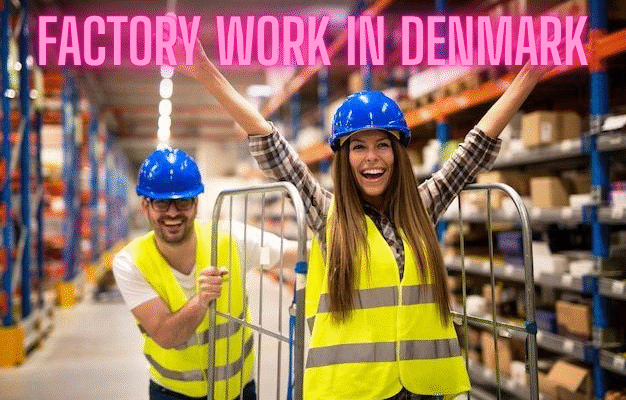- Overview of factory work in Denmark
- Types of entry-level positions
- Requirements: language, work permits, CV, safety
- Where and how to find jobs
- Application process (CV, covering letter, interview)
- Onboarding and rights
- Tips to improve chances
- FAQs
1. Overview: Factory Work in Denmark
Work in Denmark: Factory Jobs Without Experience & How to Apply. Denmark’s manufacturing sector—ranging from food and beverage to pharmaceuticals, electronics, and metalwork—is a key pillar of the economy. About 13–14% of all Danish employees work in industries that include factories and production facilities. Common sub‑sectors include:
- Food processing (dairy, meat, baked goods)
- Pharmaceuticals & medical devices
- Metal & machinery manufacturing
- Electronics & automotive components
- Packaging, plastics, textiles
Many companies offer entry-level roles that do not require prior experience, making factory jobs popular for newcomers—whether local job-seekers, migrants, or international students.
2. Entry-Level Positions You Can Get Without Experience
While exact titles may vary between companies, here are common starter roles:
- Production Operative / Machine Operator
- Assist on assembly lines, feed machines, monitor output.
- Often split shifts (early/mid/late).
- Packaging & Quality Checker
- Package goods, check weight, date labels, quality seals.
- Material Handler / Warehouse Assistant
- Load/unload shipments, transport goods internally (possibly forklift).
- Cleaning & Maintenance Assistant
- Clean machines and work areas, support preventative maintenance.
- Food Prep / Handler
- In food factories: chopping, mixing, portioning.
- Sorter / Line Monitor
- Ensure products move smoothly, remove defects, routine monitoring.
These roles typically require no formal qualifications—just willingness to learn, attention to detail, and reliability.
3. Requirements & Preparation
Language Skills
- Many roles require basic Danish (A2–B1 level).
- In international or English‑friendly firms, basic English may suffice.
- Learning Danish dramatically boosts your hiring chances and integration.
Work Permit & Right to Work
- EU/EEA/Swiss nationals can work freely in Denmark.
- Non‑EU citizens need a valid work permit—often via the Positive List or the Green Card scheme.
- Often, employers sponsor or assist with the permit for skilled roles—but less likely for entry-level.
- Check the Danish Immigration Service (SIRI) for up-to-date info.
A Simple CV
Your CV should include:
- Personal details
Name, address in Denmark (or planned address), phone, email. - Objective
“Seeking entry-level factory role. Reliable, detail-oriented, eager to learn.” - Work experience
Even non-factory jobs show transferable skills—shift work, punctuality. - Education / training
High school, vocational, certifications (even accident prevention or first aid). - Skills
Languages, basic machine knowledge, manual dexterity, teamwork. - Availability
Past experience with shifts or willingness to work nights or weekends.
Covering Letter
In 150–200 words, explain:
- Why you’re interested in factory work.
- Key traits: hardworking, reliable, quick learner.
- Your language skills and willingness to train.
- Your availability and preferred schedule.
Certified Copies
Bring certified copies of:
- Passport/ID
- Work permit (if relevant)
- Education certificates
- Any safety/driver’s licenses (e.g., forklift).
4. Where to Find Factory Work in Denmark
4.1 Online Job Portals
- Jobnet.dk – Official Danish government portal; filter by “production” or “factory.”
- Workindenmark.dk – For international job‐seekers; search “production operative” or “packaging.”
- Jobindex.dk, Ofir.dk, Stepstone.dk – Large Danish job aggregators.
- English CV option available on most.
4.2 Recruitment Agencies
Agencies specializing in industrial staffing include:
- Adecco Denmark
- Kelly Services
- Temp-Team
- Manpower Denmark
Register online, upload CV in English/Danish, indicate interest in entry-level factory roles, and they may match you.
4.3 Social Media & Facebook Groups
- Groups such as “Jobs in Denmark for English Speakers” or “Factory Workers Copenhagen” regularly post vacancies.
- Join LinkedIn Denmark, Tailor your profile to show interest in hands-on production.
4.4 Company Websites
European brands like Arla Foods, Novo Nordisk, Lego, Bang & Olufsen, Grundfos, and industrial parks around Aarhus, Odense, and Aalborg often list roles on their own career pages.
5. Application Process: Step by Step
5.1 Spotting the Perfect Job
When browsing listings, look at:
- Employment type: Full-time/part-time/temp.
- Shift schedule: Days, evenings, nights—note any shift allowances.
- Language: Some explicitly require Danish, others recruit in English.
- Requirements: Physical fitness, ability to lift weights, standing long shifts, previous shift work—especially in food/packaging.
5.2 Tailoring Your CV
- Highlight physically fit roles you’ve done.
- Note any shift availability (“including weekends, nights”).
- List soft skills: punctuality, reliability, sentence: “attended machinery safety training.”
5.3 Writing a Cover Letter
Structure:
- Intro – E.g. “I’m writing to apply for the Production Operative role…”
- Why you fit – “I work well under pressure, am highly motivated to learn machine operation…”
- Language ability – “I speak English fluently and am working toward Danish Level B1.”
- Availability – “I’m available immediately, flexible with shifts including early mornings and weekends.”
- Close & call to action – “Thank you for considering me; I’d welcome the chance to interview…”
5.4 Submitting Documents
- Online: Save CV and letter in PDF format (named e.g. “CV–[YourName].pdf”).
- Email: Concise subject line “Application: Production Operative—[Your Name].”
- Printed/hand-deliver: Required for temp-agency or local plant drop‑offs—bring folder + extra copies + certified docs.
5.5 The Interview
Expect:
- Basic questions: Why factory work, availability, shift readiness.
- Situational: “What if a machine stops suddenly?” or “how do you respond to repetitive work?”
- Physical check: Ability to stand 8+ hours, lift 15–20 kg boxes.
- Language test (if Danish required).
Bring:
- CV and cover letter copies
- Right to work documents
- Safety shoes/small boots if they request a tour
Tips: Dress cleanly—factory roles are casual, but structure matters.
6. First Weeks On the Job (Onboarding)
6.1 Training & Standard Procedures
- Introduction: Safety briefing, tour of facility, explanation of PPE (helmets, gloves).
- Machine training: Hands-on guidance by mentor/trainer.
- Documentation: Learn how to log production output, report malfunctions.
6.2 Shift Types & Pay
- Shifts: early mornings, days, evenings, nights, weekends.
- Base pay varies; Danish collective agreements set typical rates:
- Packaging/line assistant: ~DKK 130–160/hour.
- Machine operators: ~DKK 135–180/hour.
- Shift premiums: extra pay for late/evening/night shifts (~10–30%).
6.3 Worker Rights & Conditions
- Collective bargaining: Most factories are unionized (e.g., 3F, Industriens Fællesudvalg).
- Working hours: Usually 37 hours/week. Overtime rates mandated.
- Breaks: ~30 minutes for every 5 hours, plus paid coffee/bathroom breaks.
- Safety & wellness: Injuries must be logged; companies offer health screenings and ergonomic support.
6.4 Career Progression
- Promotion paths:
- Operator ➔ Shift Supervisor ➔ Maintenance ➔ Quality Control ➔ Full Technician.
- Many companies invest in internal Vocational Education and Training (VET) programs (e.g. machine mechanics) after a year or two.
7. Tips to Increase Your Chances
- Learn Danish – Free municipal classes (for newcomers). Shows effort & seriousness.
- Get a Forklift Licence (truck certification) – High demand in warehousing.
- Highlight physical fitness – Especially if moving goods or standing long periods.
- Highlight shift readiness – State your flexibility clearly.
- Use network – Ask people already working in plants, sometimes openings aren’t advertised.
- Temp agency first – Temp-to-perm is a frequent route.
- Attend job fairs – Industry fairs like “Jobmesse” in Odense, Aarhus.
- Use municipality services – Your local Jobcenter helps newcomers and unemployed find jobs + CV help.
8. FAQs
Q: Do I need experience with machinery?
A: No—most companies provide on‑the‑job and in‑house training. Previous manual or shift work helps.
Q: Can non-EU nationals get these jobs?
A: It’s possible but harder. Some companies do sponsor workers after they demonstrate commitment.
Starting via a temp agency or holiday job is a practical route—allowing you to gain Danish language and references.
Q: Necessary certifications?
A: PPE training is provided. Optional forklift licences and first‑aid certificates are advantageous.
Q: How long does the process take?
A:
- CV + cover letter → apply →
- 1–3 weeks for interview →
- Training and probation for 1–3 months →
- Permanent contracts often after probation.
Q: Shift preferences?
A: State availability clearly. Night shifts earn more but can affect lifestyle. Many plants rotate.
9. Real‑life Application Timeline (Example)
| Week | Activity |
|---|---|
| 1–2 | Prepare CV, learn Danish, get forklift course |
| 2 | Register with Jobnet, agencies, job fairs |
| 3–4 | Apply to 10–15 roles, follow up |
| 4–5 | Attend interviews and plant visits |
| 5–7 | Begin initial training at job |
| 8–12 | Complete probation, join VET/training |
APPLYING LINK
Action Plan: What to Do Next
- Write a Danish‑style CV (Name, photo optional, bullet‑points).
- Prepare a basic cover letter tailored for factory roles.
- Sign up on Jobnet.dk and Workindenmark.dk.
- Contact 2–3 temp agencies.
- Join relevant Facebook / LinkedIn groups.
- Enroll in a Danish evening course and consider forklift license.
- Begin applying and follow up weekly.
- Use Jobcenter assistance if needed.
Suggested Resources
- Workindenmark.dk – English-language support for labor market entry
- 3F (Fagligt Fælles Forbund) – Major labor union with industrial focus
- Arbejdstilsynet.dk – Health & Safety at Work
- SIRI.dk – Work permits and immigration
- Adult Learning Centres (VUC) – Free Danish language courses
In Summary
- Entry-level factory jobs are widely available in food, metal, electronics, packaging, and logistics.
- You don’t need prior experience—just willingness to work, learn, and engage.
- Focus on basic Danish, CV, cover letter, temp agency applications, and networking.
- Expect an interview, safety training, probation.
- Enjoy benefits: fair pay, stable working conditions, and career growth.
If you’d like help drafting a CV, preparing answers for typical interview questions, or want tips on Gaelic safety standards or Danish unions—just ask! Wishing you success in landing your first factory role in Denmark.

